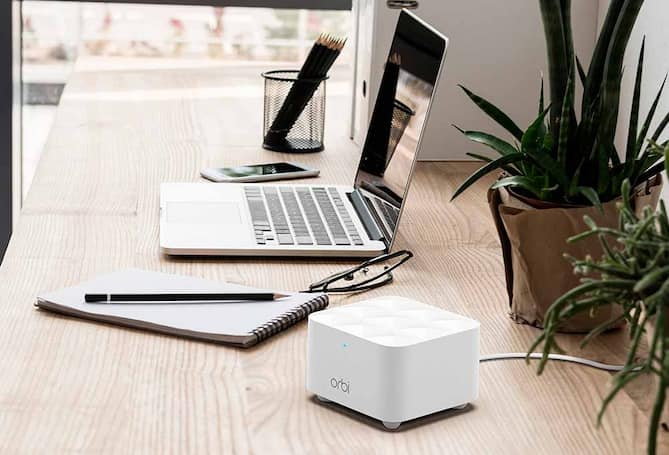Wi-Fi or Ethernet: Which is Best for Work?

carousel
Wi-Fi vs. Ethernet
Using Wi-Fi for work
When it comes to business Wi-Fi and networking, using a wireless network lets professionals break free from the constraints of traditional wired setups and seamlessly navigate the virtual realm. Benefits of using Wi-Fi connectivity for work include:
- Mobility and convenience. With a Wi-Fi connection, you can work anywhere within your wireless network’s range. Whether you prefer working from your home office, a coffee shop or even outside on the patio, you can move around without being tied down to a physical connection.
- Simple setup and use. Unlike Ethernet, which requires connecting cables to both your device and the router, setting up Wi-Fi is as simple as typing in a password. Most contemporary devices come with built-in Wi-Fi capabilities, making the connection to a wireless network more convenient.
- Compatibility with multiple devices. Wi-Fi can connect numerous devices, allowing your laptop, smartphone, tablet and other gadgets to connect simultaneously. This is particularly useful if you work with more than just your computer.
- Cost efficiency. Installing and maintaining wired networks can be more expensive and time-consuming than setting up a Wi-Fi network. Wi-Fi eliminates the need for extensive cabling, making it a cost-effective solution for home offices, small businesses and large enterprises.
As the demands of remote and flexible work continue to grow, Wi-Fi remains a fundamental enabler of connectivity for professionals everywhere.
Using Ethernet and an Ethernet switch for work
Ethernet is a robust family of networking technologies that provide a stable foundation for your local area network (LAN), but what is a network switch? An intelligent networking device that optimizes data transfer within your network, a network switch enhances office connectivity. Benefits of Ethernet and Ethernet network switches include:
- Superior speed and reliability. With a wired connection, you can enjoy faster data transfer rates, which is essential when dealing with large files or streaming high-definition videos. This can significantly boost your productivity and efficiency.
- Low latency. Ideal for participating in video conferences, a wired connection reduces delays and lag to allow for smooth interactions. This is particularly important for professionals who rely on real-time communication and need immediate responses.
- Better security and protection. A wired connection using Ethernet cables is more secure and less susceptible to external disruptions. This is useful if you’re handling sensitive data or working in a crowded office space.
- Individualized data forwarding. Ethernet switches forward data selectively to the specific device for which it is intended. This individualized forwarding reduces unnecessary network traffic and promotes overall network efficiency.
Leveraging an Ethernet hub and a net switch in a work setting provides a foundation for high-performance and a secure and scalable network infrastructure. This ultimately contributes to increased productivity and a smooth workflow.
Which option has the best network security?
If you’ve ever looked into how to set up your home network, you should know how important network protection is. Implementing measures to protect computer networks and their components from unauthorized access, attacks and disruptions is crucial when you are working.
Both Wi-Fi and Ethernet can be secure if configured properly. However, Ethernet is generally considered more secure than Wi-Fi because it is a wired connection. Ethernet connections require physical access to the network and they don’t broadcast signals that can be easily intercepted by nearby devices. This makes Ethernet less susceptible to interference and eavesdropping than wireless networks.
Since signals can extend beyond physical boundaries, Wi-Fi can be more vulnerable to unauthorized access. Encryption protocols can add a layer of security to wireless networks, but it is still a good idea to:
- Monitor network traffic for any unusual or suspicious activity
- Regularly update firmware and security settings on routers and other networking equipment
- Use strong, unique passwords and consider implementing two-factor authentication
Is Wi-Fi better than Ethernet?
When it comes to finding the best internet connection for work, both Wi-Fi and Ethernet have their own set of advantages and limitations. Wi-Fi excels in providing flexibility and convenience, making it ideal for situations where running cables is impractical. Ethernet, on the other hand, offers a stable connection, ensuring consistent speed and less susceptibility to interference.
Hopefully you now have a better understanding of what is best for your business and Wi-Fi networking needs. Ultimately, the decision between Wi-Fi and Ethernet should align with the specific priorities that your job requires, the number and types of connected devices and the importance of a reliable and secure network.